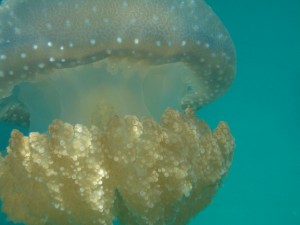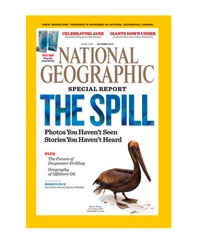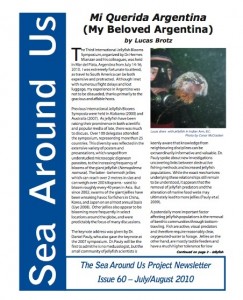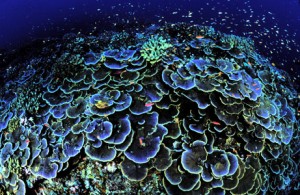 The global catch of jellyfish is now at more than 250,000 tonnes of tentacles every year. However, researchers like the Sea Around Us Project‘s Lucas Brotz, are still trying to figure out if there has been a rise of jellyfish globally. Brotz is using anecdotal information of jellyfish accounts through time to build a global model and he is seeing evidence of population increases but is not yet prepared to say if they are significant, which is mentioned in a recent article at Livescience asking if jellyfish are menaces or misunderstood. His work was also recently mentioned and in a story at edible Vancouver, exploring the jellyfish as the next catch du jour.
The global catch of jellyfish is now at more than 250,000 tonnes of tentacles every year. However, researchers like the Sea Around Us Project‘s Lucas Brotz, are still trying to figure out if there has been a rise of jellyfish globally. Brotz is using anecdotal information of jellyfish accounts through time to build a global model and he is seeing evidence of population increases but is not yet prepared to say if they are significant, which is mentioned in a recent article at Livescience asking if jellyfish are menaces or misunderstood. His work was also recently mentioned and in a story at edible Vancouver, exploring the jellyfish as the next catch du jour.
Collaboration with National Geographic on ‘Seafood Print’
 We should be thinking about seafood consumption in terms of the type of fish we eat (predatory vs. forage fish) rather than simply by weight. Enter the seafood print — or the oceanic primary production required to generate a specific fisheries catch — featured this month in Paul Greenberg’s article for National Geographic titled Time for a Sea Change. The work is done by the Sea Around Us Project scientists in collaboration with National Geographic fellow Enric Sala; more details and methods are here. The top three largest seafood prints are made by China, Japan and the U.S. The Washington Post has covered the findings as well as the AFP. More results are to come as part of a scientific contribution, currently under review.
We should be thinking about seafood consumption in terms of the type of fish we eat (predatory vs. forage fish) rather than simply by weight. Enter the seafood print — or the oceanic primary production required to generate a specific fisheries catch — featured this month in Paul Greenberg’s article for National Geographic titled Time for a Sea Change. The work is done by the Sea Around Us Project scientists in collaboration with National Geographic fellow Enric Sala; more details and methods are here. The top three largest seafood prints are made by China, Japan and the U.S. The Washington Post has covered the findings as well as the AFP. More results are to come as part of a scientific contribution, currently under review.
July/August 2010 Newsletter
 Read about Lucas Brotz and Daniel Pauly’s presentations at the Third International Jellyfish Blooms Symposium, Jennifer Jacquet’s firsthand impression of the BP oil spill, and the reconstruction of marine fisheries catches in Mauritius in the July/August newsletter.
Read about Lucas Brotz and Daniel Pauly’s presentations at the Third International Jellyfish Blooms Symposium, Jennifer Jacquet’s firsthand impression of the BP oil spill, and the reconstruction of marine fisheries catches in Mauritius in the July/August newsletter.
How Much Is that MPA in the Ocean?
 Dr. Ashley McCrea-Strub, a post-doc with the Sea Around Us Project, is lead author of a study quantifying the costs of establishing marine protected areas, finding that managers have spent a wide ranging $41 – $1.1 million per square kilometer to get new reserves up and running. Studies have been done in the past that look at costs of running MPAs (such as this by 2010 article Cullis-Suzuki & Pauly) but this is the first attempt to quantify the cost of establishing MPAs in the first place. For more on McCrea-Strub’s work, read popular coverage of the work at Conservation Magazine or the full article at Marine Policy.
Dr. Ashley McCrea-Strub, a post-doc with the Sea Around Us Project, is lead author of a study quantifying the costs of establishing marine protected areas, finding that managers have spent a wide ranging $41 – $1.1 million per square kilometer to get new reserves up and running. Studies have been done in the past that look at costs of running MPAs (such as this by 2010 article Cullis-Suzuki & Pauly) but this is the first attempt to quantify the cost of establishing MPAs in the first place. For more on McCrea-Strub’s work, read popular coverage of the work at Conservation Magazine or the full article at Marine Policy.
Scientists Question MSC
 The Marine Stewardship Council, the fisheries eco-certification taken most seriously by consumers and scientists around the world, is failing to fulfill its promise, write six scientists, including the Sea Around Us Project’s Jennifer Jacquet and Daniel Pauly, in last week’s issue of Nature. Read their opinion piece, Seafood stewardship in crisis, or some of the media coverage, such as Why your sustainable fish may not be as guilt-free as you think at The Independent, Scientists criticize system of certifying fisheries at The New York Times Green Blog, or Sustainability certification fails to protect environment: report in the Vancouver Sun.
The Marine Stewardship Council, the fisheries eco-certification taken most seriously by consumers and scientists around the world, is failing to fulfill its promise, write six scientists, including the Sea Around Us Project’s Jennifer Jacquet and Daniel Pauly, in last week’s issue of Nature. Read their opinion piece, Seafood stewardship in crisis, or some of the media coverage, such as Why your sustainable fish may not be as guilt-free as you think at The Independent, Scientists criticize system of certifying fisheries at The New York Times Green Blog, or Sustainability certification fails to protect environment: report in the Vancouver Sun.

